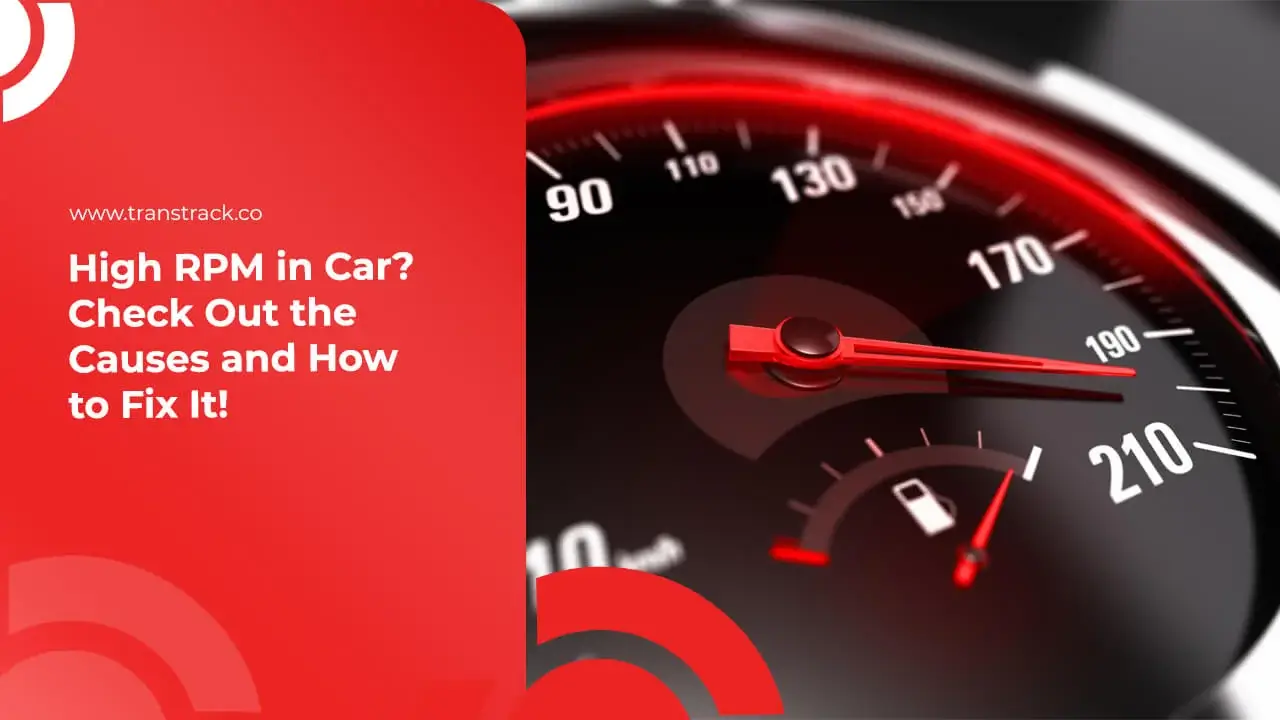High RPM in Car? Check Out the Causes and How to Fix It!
Posted on March 21, 2025 by Nur Wachda Mihmidati

High RPM, have you ever experienced it? A car engine operating at abnormal revolutions per minute (RPM) can be a sign of a problem that needs to be addressed immediately. High RPMs not only interfere with driving comfort, but can also signal a deeper problem in your car’s engine system.
In this TransTRACK article, we will explore the various causes that may lead to high car RPMs, as well as the steps that can be taken to resolve the issue. More than just finding a quick solution, we will also highlight the importance of regular maintenance and the use of advanced vehicle maintenance systems to prevent similar issues in the future.
Let’s explore together the causes and solutions for high car RPM, as well as how regular maintenance can be the key to maintaining your vehicle’s optimal performance.
Causes of High RPM
High RPM in a car can be caused by several factors. Here is an explanation of each cause:
Throttle Valve Disruption
The throttle valve is a valve that regulates the amount of air entering the engine. If the throttle valve gets stuck or stuck in a certain position, it can disrupt the flow of air entering the engine. This can be caused by dirt or scale that builds up around the valve. When enough air does not enter the engine, the engine may need to pump more air to reach the desired RPM, which can result in high RPMs.
Idle Speed Control (ISC) Malfunction
Idle Speed Control (ISC) is a component that regulates the amount of air entering the engine when the engine is idling. The ISC is usually controlled by the ECU (Engine Control Unit) to maintain a stable idle RPM. If the ISC is damaged or has problems, the engine may not be able to maintain a proper idle RPM, which may result in high RPM when the engine is running at idle.
Clogged Injectors
The injector is responsible for spraying fuel into the combustion chamber. If the injector is clogged or blocked by dirt or fuel residue, it can disrupt the fuel spray pattern. As a result, the fuel will not be properly distributed into the combustion chamber, which may lead to uneven combustion and increased RPM.
Damage to the ECT Sensor Unit
The ECT sensor measures the engine temperature and provides information to the ECU. This temperature information is used by the ECU to adjust the fuel and air settings entering the engine. If the ECT sensor malfunctions or sends inaccurate signals, the ECU may not be able to regulate the fuel and air properly, which could lead to an increase in RPM.
Disruption of the Ignition Coil
The ignition coil is responsible for generating the high voltage required to spark the spark plug. If the ignition coil is damaged or not functioning properly, it can disrupt combustion in the engine cylinders. As a result, uneven combustion may occur, which may cause the engine to run unstably and increase RPMs.
Dead Engine Spark Plug
Spark plugs are the components that cause the combustion of the air-fuel mixture in the combustion chamber. If one of the spark plugs is dead or damaged, it can lead to incomplete combustion or even no combustion at all in one of the cylinders. This can result in an increase in RPM as the engine tries to compensate for the loss of power from a cylinder that is not functioning properly.
It is important to remember that an accurate diagnosis requires a thorough examination by a trained and qualified mechanic. Quite often, some of these factors can also be interrelated, so it is important to check all possible causes.
Impact of High RPM on Car
High RPM (Revolutions Per Minute) on a car engine can have various negative impacts, both in the short and long term. Here are some of the impacts that need to be considered:
1. Increased Fuel Consumption
High RPMs mean that the engine is working harder, which leads to burning more fuel. This can reduce the fuel efficiency of the car, leading to greater expenditure on fuel.
2. Damage to the Engine
- If the engine operates at higher than recommended RPMs for an extended period of time, it can cause excessive wear on engine components. This can lead to serious damage to parts such as pistons, valves, and engine bearings.
- Engines that continue to operate at high RPMs are also at risk of overheating, which can damage critical components.
3. Increased Risk of Damage to Other Components
- Alternator: Alternators operating at high RPMs can quickly wear out and malfunction, which can cause electrical problems in the car.
- Cooling System: High RPMs can cause the coolant pump and cooling system to work harder, accelerating damage to components such as the radiator or cooling fan.
- Transmission: On vehicles with automatic transmissions, high RPMs when they should not be can increase stress on the transmission system, accelerating wear and damage.
4. Increased Exhaust Gas Emissions
- Engines operating at high RPMs often result in incomplete combustion, which can increase exhaust emissions such as carbon monoxide (CO), hydrocarbons (HC), and nitrogen oxides (NOx).
- Not only is this bad for the environment, but it can also cause the car to fail to meet emission standards set by authorities.
5. Reduced Engine Life
Continuous use of the engine at high RPMs can reduce the overall lifespan of the car. Components working at high speeds are more prone to wear and tear, which can eventually lead to expensive repairs or replacement of engine components.
6. Reduced Driving Comfort
High RPMs can cause stronger vibrations and louder engine sounds, which can reduce driver and passenger comfort. In addition, the sensation of high speed may increase stress or fatigue when driving for long periods.
7. Decreased Car Performance
Even though the engine operates at high RPMs, the performance of the car may decrease due to inefficient combustion and a harder-working engine. As a result, acceleration and engine response can be sub-optimal.
8. Damage to the Drive System
In vehicles that use drive systems such as CVT (Continuously Variable Transmission), high RPMs can cause additional stress on the drive system and affect transmission performance.
How to Solve High Car RPMs
Here are ways to overcome high RPM in a car:
Disassemble and Clean the ISC Unit
The ISC (Idle Speed Control) is a component that regulates the amount of air entering the engine when the engine is idling. If the ISC is dirty or obstructed, it could cause problems in maintaining the proper idle RPM. By disassembling and cleaning the ISC unit, you can remove any dirt or scale that may be interfering with its performance.
Replace Faulty Spark Plugs
Damaged or improper spark plugs can lead to incomplete combustion in the combustion chamber, which in turn can lead to increased RPM. By replacing old spark plugs with new ones that meet the specifications recommended by the car manufacturer, you can ensure optimal combustion in the engine.
Checking and Replacing the Ignition Coil
The ignition coil is responsible for generating the high voltage needed to spark the spark plug. If the ignition coil is damaged or not functioning properly, it can disrupt combustion in the engine and cause an increase in RPM. Checking and replacing the damaged ignition coil can help fix this problem.
Cleaning the Throttle Body Unit
The throttle body is where air enters the engine. If the throttle body is dirty or obstructed by dirt or scale, it can disrupt the flow of air entering the engine and cause an increase in RPM. By thoroughly cleaning the throttle body assembly, you can remove obstructions and ensure optimal airflow to the engine.
Replacing a Faulty ECT Unit
The ECT (Engine Coolant Temperature) sensor is a component that measures engine temperature and provides information to the ECU (Engine Control Unit). If the ECT sensor is damaged or not functioning properly, it can interfere with the regulation of fuel and air entering the engine, which could lead to an increase in RPM. By replacing the faulty ECT unit with a new and functioning one, you can fix this problem.
Be sure to perform regular maintenance on the car and have regular checks done by a trained mechanic. If the high RPM problem still persists after taking these steps, it is advisable to take the car to a repair shop for further diagnosis and repair.
In dealing with high RPM issues in your car, it is important to not only focus on a quick fix, but also pay attention to regular maintenance and upkeep. By using TransTRACK’s Vehicle Maintenance System, you can easily manage a regular maintenance schedule for your car and get regular updates on the condition of your car.
With this system, you can track your car’s maintenance history, including oil changes, routine engine maintenance, and other key component checks. In addition, TransTRACK can also provide maintenance recommendations based on your car’s specific usage and condition, helping you to maintain your car’s performance and reliability in the long run.

Don’t let small problems develop into more serious ones. Take advantage of Vehicle Maintenance System from TransTRACK now to keep your car in top condition and avoid unwanted problems on the road. With TransTRACK, your trip will be safer, more comfortable, and more secure.
Recent Post
Topic :
 Bahasa Indonesia
Bahasa Indonesia









